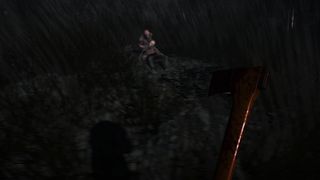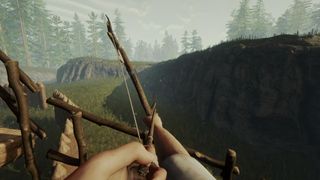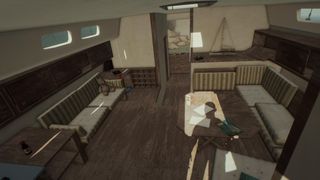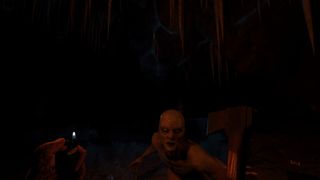The Forest VR is terrifying, atmospheric and clumsy all at once
Clunky controls don't spoil your sense of place in an immersive, creepy world.

The Forest VR somehow manages to be both a clumsy VR port and a brilliant example of how virtual reality can improve a game. It does some things much better than the non-VR version: I want its clever watch-based HUD in every VR game, and playing with a headset is far scarier and more atmospheric. But it also feels like Endnight Games couldn’t break free of the constraints of the base game, and lots of its VR elements end up feeling like afterthoughts. The parts that do work—and even the ones that don't—exemplify just how much changes when you make a game for virtual reality.
VR wasn't an afterthought for The Forest, but the VR version that exists now was retrofit to the base game. Creative director Ben Falcone tells me that the team started testing The Forest VR way back in 2013, before the open-world survival game even entered Early Access. But it was a struggle—everyone on the team would get motion sickness from playing, which made both developing and testing for VR systems difficult and time-consuming.

Initially, they intended to put the game’s regular animations into VR, using headsets to make players feel more present in the world, but when they tried out touch controls for chopping a tree the right choice was obvious. "We knew we needed to convert all the weapons to this system," he says. And chopping a tree, along with other basic interactions, certainly feels more fun in VR. As you chop, the tree splinters based on the angle of your swing, and I like being able to crouch down to where I’ve started chopping, circle round the tree to find where the wood remains attached and take out the last chunk.
I love the way your stats are displayed, too. Everything useful is tracked in your watch, including hunger, thirst and energy. Your hunger is shown by a big meter shaped like a stomach that gradually empties, and it’s all big and bright and easy to read at a glance.
It’s a small thing, but it’s an example of how The Forest VR always keeps you grounded in its world. The base game already did that by putting its menus in-game: your inventory is just all your items laid on a mat in front of you, and the crafting menu is a book you pull out of your backpack. But being surrounded by the world on all sides in VR makes it more believable. "You’re instantly in the game and playing in VR from the first moment you turn it on, there are no tutorials, no forced missions," says Falcone. "In our minds this makes it the perfect type of game for VR."
The lighting looks excellent in VR, especially at night. Forests feel dense and unknowable, and the way the shadows flicker in the firelight is creepy. VR games are, in general, more scary than non-VR games because it feels like there’s no escape, and that holds true for The Forest: it’s terrifying with a headset. I’ve mainly been playing in peaceful mode, which removes enemies, because the first time I saw a cannibal in the distance I yelped aloud, ran back to my base and cowered in the corner. I’m always looking over my shoulder, and catching sight of something moving in my peripheral vision gives me the chills every time—something that doesn’t happen when I'm not wearing one of the best VR headsets.

It surprised the development team just how scary the VR version was, Falcone says. "Everyone on the team was pretty desensitized to the horror elements of the game by the time the VR version was in its testing stages, [but] we all had some jump scare moments seeing the enemies at actual scale, and actually feeling present in the world." Caves are especially spooky, and when you walk through one it feels like you’re being squeezed by rock on all sides. When the monsters start gurgling, I can’t help but panic.
The biggest gaming news, reviews and hardware deals
Keep up to date with the most important stories and the best deals, as picked by the PC Gamer team.
But some of that atmosphere is undermined by clumsy mechanics, and the touch controls aren’t as slick as I’d hoped. You can’t squeeze your fist on demand, for example, or transfer objects from one hand to the other. You pick your preferred weapon hand in a menu, and all the other one can do most of the time is hold a lighter and open your inventory.
And when I’m forced to fight those enemies that I was so afraid of, the VR controls make it way too easy. The game doesn’t seem to care whether you’ve swung your weapon with any weight—it just cares about whether you’re making contact, so you can basically flail your weapon back and forth in front of you and deal tonnes of damage, constantly staggering the monsters you’re up against.
While I haven’t tested many of the late-game item interactions, the early game stuff often feels janky. When you chop down a tree, it splits into logs as it falls to the ground. You can load a couple of logs at a time onto your shoulder to carry them around—and apparently that doesn’t require you to use your hands at all. The logs just sit on your shoulder and swing around when you move your head, as if they weigh nothing. It’s floaty and awkward. The crafting menu is a nightmare because the only way to select anything is to point with your hand: you can’t scroll through its near infinite pages by squeezing triggers, which seems like a no-brainer.

The Forest VR also regularly switches viewpoint to the third-person, which is jarring. I like building treehouses, which you reach by climbing a rope. When you interact with that rope in VR, the camera pulls back slightly from your body so you see your character’s back, and you have to press the control stick to climb up. The camera then flicks to halfway up the rope, pauses for a bit, and then rejoins your character’s eyes when they’re in the house. All of these little things show how easy it is to break immersion in a VR game, and how many things need to be changed when adapting from one format to the other.
But despite the clumsiness of some of the VR elements, it’s still the version of the game I prefer. I haven’t played it multiplayer, but from the many playthroughs I’ve watched it looks brilliant—a mix of slapstick VR fun and a genuine sense that you’re relying on your teammates. "Seeing a player wave at you or dance around a fire is one of the coolest parts of the experience in multiplayer," Falcone says. "We think this was one of the most successful parts of the conversion to VR."
And besides, I never played the base game for the purity of its mechanics—I played it for the feeling of being lost in, and battling against, a hostile world. Wearing a headset makes me feel more lost in that world than ever, and I’m willing to put up with some awkward controls for that extra dose of atmosphere. Just don’t ask me to delve into any more caves, please.
Samuel Horti is a long-time freelance writer for PC Gamer based in the UK, who loves RPGs and making long lists of games he'll never have time to play.

Palworld developer reports Nintendo's suing over 3 Pokémon patents for only $66,000 in damages, but a videogame IP lawyer says fighting the lawsuit could mean 'burning millions of dollars'

No Man's Sky gets cross-save on a dozen platforms and brings back Mass Effect's Normandy as a limited-time rewar
Most Popular


